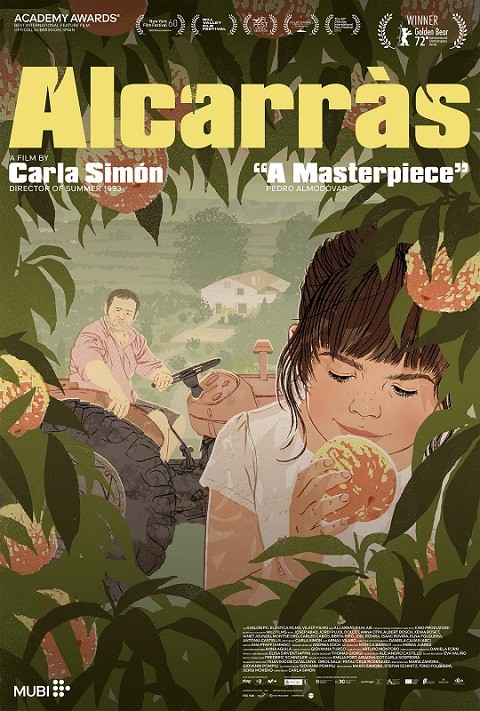Alcarras
Introduction
It is a Tuesday and miles to go for the weekend but as promised I am knocking off a few films from my watchlist. With that I finished watching the new Spanish film Alcarràs which is now streaming on Mubi. It was Spain’s official entry to the Academy Awards this year(unofficially out of contention now) and the winner of Golden Bear award.
One of the reasons why I do explore films across the globe is because I am a fan of culture. Films for me are a perfect sneak into the culture of a particular place and from the synopsis of Alcarras, I was expecting the same. I have watched and witnessed many Indian films centered around a village which do add so much texture to the overall storytelling. And I always did have a lingering thought on what it would be if the setting of the story changes to a foreign location, specifically a village or a countryside. I haven’t been exposed to too many foreign films which would set a rural story against the backdrop of an ongoing conflict. And precisely for this reason, I was anticipating the much awaited release Alcarras since quite some time now. I finally did get my chance last night and here are my two cents on Alcarras.
Story & Screenplay
Alcarras follows the story of a family of farmers whose life changes after the landlord of their land decides to sell it, thereby threatening their livelihood. The story here is simple and almost unassuming with the way it unfolds. You will get a feeling that nothing much is taking place but when you do look back, it does have a lot to say in its subtext beneath its layers. The screenplay standing at a shade under 2 hours does make for a breezy watch wherein I was exposed to a rural life in a foreign land for the very first time. This section will contain mild spoilers.
The drama is a slow burn and unfolds at a leisurely pace. The opening shot itself is about a group of children playing in the fields inside an abandoned car which the children believe is their space ship. Suddenly, when the car is taken out by a crane, it did seem to the children that their home has been taken away from them. This very scene is symbolic of the entire drama to follow. We are told that the family, traditionally farmers, farming peaches and eventually selling them, is undergoing a bit of a conflict wherein their landlord has opted to install solar panels while cutting down their peach trees. And so there is bound to be a change in their livelihood wherein the fear of the unknown awaits them.
The interesting part of the drama is that there is no hook in the screenplay. So even the conflict does seem almost like an everyday issue for a family who is reeling under poverty in many ways. The head of the family, Rogelio, had earlier helped the landlords to hide during the world war and in return they had asked him to do farming in their fields. It was more of a verbal communication which did not hold true in the current day setup. The thing to note here was that Rogelio had done farming all his life and this ‘change’ was something which he was unsure on how to cope with.
The family does also comprise of Quimet who is the father, frustrated and angry with this development. He is seen throwing tantrums often on his family and sister which has resulted in the family having a sort of a stand-off. His son Roger does take a keen learning on farming(against his father’s wishes who wants him to focus on his education) and he does grow weed without his father’s knowledge. On being exposed, he does extract revenge by opening a trench to spoil the peach crop before running away. This portion was representative of the prevalent patriarchy which is inflicted on the characters of the wife and her two daughters wherein the men of the house aren’t able to fully handle the situation. In a subtly moving scene, the character of the wife slaps her husband and son(once he returns), an action resulting in a lot of build up of emotions within her.
The proceedings are simple and niche but quite engrossing. I was amazed at how similar the life of a farmer is elsewhere in the world. A social commentary on the prevalent capitalism in the industry can be attributed to the farmer’s protest in the drama which was eerily similar to that which was conducted in India, a while back. The plight of the farmers does need a change wherein they need to be empowered more. I also did like how the drama was representative of different generations, each with their own ideologies. As many as four generations was shown and with it, a distinct demarcation of their thoughts.
The final scene is achingly moving yet it brings with it a lot of hope. On one side, we see the deforestation representing the destruction of the peach trees which is symbolic of the current life of the family. On the other hand, we see the entire family close-knit(despite a couple of sour relationships) and together signifying hope in their next phase of their lives. Overall, the screenplay is beautifully written and representative of the plight of the farmers irrespective of the world wherein it is set in.
Dialogues, Music & Direction
The dialogues are conversational giving an impression that the film is in fact a docu-drama. The level of detailing was terrific to watch. The film did not have a BGM, and instead did rely on the natural sounds and songs such by the characters. The cinematography was beautiful, capturing the sunny landscapes and the beautiful peach trees wonderfully that did add a bright vibe to the drama. This was in contrast to the unfolding drama which was a clever use of the present coupled with the fear of the unknown in the future, something that was painted well in the viewer’s mind. The editing could have been a little more sharper. Director Carin Simón does a fabulous job here in painting this drama with broad strokes while paying fleeting attention to the detailing to make the drama subtly impactful.
Performances
The performances are excellent here by almost all actors who are ‘Non-Actors’. Ainet Jounou as Iris is such a sweet kid and she does a fine job. Josep Abad as Rogelio and Albert Bosch as Roger have their moments to shine. Xenia Roset as Mariona is wonderful and she does a great job. Anna Otin as Dolors is wonderfully restrained. Jordi Pujol Dolcet as Quimet is fabulous to watch too.
Conclusion
Alcarras is a subtly moving tale of loss and hope that comes with my highest recommendation. Available on Mubi and Highly Recommended.




